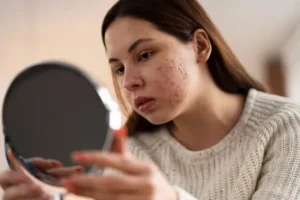What Causes Acne in Teens?
Acne is a prevalent skin condition that affects many teenagers as they go through puberty. Understanding the underlying causes of acne in teens is crucial for effectively treating and preventing breakouts.
One of the primary factors contributing to teen acne is hormonal changes. During adolescence, the body experiences increased production of androgens (such as testosterone), which overstimulate sebaceous (oil) glands. This leads to the overproduction of sebum, an oily substance that can clog pores and contribute to acne.
In addition to hormonal fluctuations, genetics play a significant role in whether a teen will develop acne. If one or both parents had acne, their children are more likely to experience it as well. Genetic factors influence sebum production, pore size, and inflammatory response, all of which impact the development of acne.
Environmental factors, including pollutants, irritants, and certain chemicals, can also trigger inflammation in the skin, worsening existing acne symptoms. Another common cause is improper skincare habits, such as using harsh cleansers or scrubbing too aggressively, which can damage the skin’s natural barrier and lead to increased oil production. Not moisturizing properly or using comedogenic (pore-clogging) products can further exacerbate breakouts.
Dietary choices are also linked to acne. Processed foods, excessive sugars, and dairy products can contribute to inflammation within the body, which may worsen acne. Learn more about the connection between diet and acne here.

What Are Different Types of Acne Bumps?
Understanding the different types of acne bumps is key to managing and treating teen acne. Common types include:
- Whiteheads (Closed Comedones): These occur when pores become clogged with oil, dead skin cells, and bacteria, but the top of the pore remains closed, causing a white or flesh-colored bump.
- Blackheads (Open Comedones): Blackheads form when the pore remains open, allowing the trapped oil and bacteria to oxidize, which gives them their characteristic dark color. They are typically found on the nose, cheeks, and chin.
- Papules: These are small, red bumps caused by inflammation deep within the pore. They are tender to touch and can develop into more severe acne if not treated properly.
Identifying which type of acne you’re dealing with allows for a more targeted approach in choosing the right treatment and skincare products.
What Can Make Acne Worse?
Several factors can worsen teen acne. Common culprits include:
- Improper Skincare: Failing to cleanse the skin regularly or using harsh, abrasive products can clog pores and lead to breakouts. Overwashing can also strip the skin of natural oils, causing the body to produce even more oil.
- Diet: While not directly causing acne, high-glycemic index foods (like sugary snacks and processed carbs) can trigger hormonal changes that increase oil production. Dairy has also been linked to acne flare-ups due to its hormone content.
- Stress: Stress triggers the release of cortisol, a hormone that can stimulate oil glands, leading to more breakouts. Moreover, stress can weaken the immune system and make existing acne worse.
For tips on managing stress and its impact on skin health, check out this guide on managing stress for healthier skin.
Key Tips to Help Prevent Acne
While acne can’t always be completely prevented, there are several key steps you can take to reduce the likelihood of breakouts:
- Maintain Proper Hygiene: Wash your face twice a day with a gentle cleanser to remove dirt, oil, and bacteria. Avoid harsh scrubbing or abrasive products, as these can irritate the skin and worsen acne.
- Clean Bedding and Towels: Regularly wash pillowcases, towels, and other items that come into contact with your face. These can accumulate bacteria and oils that contribute to acne.
- Follow a Healthy Diet: Focus on a diet rich in fruits, vegetables, whole grains, and lean proteins. Minimize sugary snacks, processed carbohydrates, and dairy products. Drinking plenty of water will also help keep your skin hydrated and flush out toxins.
- Manage Stress: Engage in stress-relieving activities like exercise, meditation, or hobbies that bring joy. Reducing stress can help prevent acne flare-ups linked to hormonal changes.
By following these preventive measures, you can significantly reduce the risk of acne breakouts.
How to Treat Acne
For treating acne, a multi-faceted approach is essential. Here are some effective strategies:
- Establish a Skincare Routine: Cleanse your skin twice a day with a mild, non-comedogenic cleanser to remove excess oil, dirt, and impurities. Moisturize with an oil-free, non-comedogenic moisturizer to keep your skin hydrated without clogging pores.
- Topical Treatments: Over-the-counter treatments containing ingredients like benzoyl peroxide, salicylic acid, or sulfur can help reduce acne-causing bacteria, unclog pores, and reduce inflammation. Be sure to start with lower concentrations to avoid skin irritation.
- Prescription Medications: For more severe acne that doesn’t respond to over-the-counter treatments, prescription medications like topical retinoids or oral antibiotics may be needed. These can regulate skin cell turnover, reduce inflammation, and combat bacterial growth.
- Healthy Lifestyle: Maintaining a diet rich in fruits, vegetables, and lean proteins while avoiding sugary and fatty foods can support overall skin health. Regular exercise boosts circulation and reduces stress, further improving skin conditions.
For more detailed advice on acne treatments, check out this guide from the American Academy of Dermatology.
Conclusion
Addressing teen acne requires a comprehensive approach that combines skincare practices, lifestyle modifications, and sometimes medical interventions. By understanding the root causes of acne and recognizing the different types of acne bumps, individuals can tailor their treatment strategies more effectively. Additionally, avoiding common triggers like improper skincare, excessive oil production, and certain foods can help prevent acne from worsening.
A consistent skincare routine, a healthy diet, and managing stress are key components of a clear complexion. Acne may be a common condition for teens, but with the right approach and mindset, it is manageable. Remember, seeking professional advice from a dermatologist is always a great step when acne becomes persistent or severe.